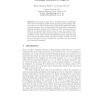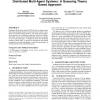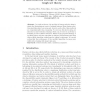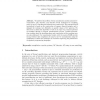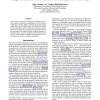3071 search results - page 47 / 615 » Explanatory Design Theory |
IFM
2007
Springer
15 years 4 months ago
2007
Springer
We present an approach to modelling Abadi–Cardelli-style object calculi as Unifying Theories of Programming (UTP) designs. Here we provide a core object calculus with an operatio...
ATAL
2005
Springer
15 years 3 months ago
2005
Springer
Distributed Multi-Agent Systems (DMAS) such as supply chains functioning in highly dynamic environments need to achieve maximum overall utility during operation. The utility from ...
RSKT
2009
Springer
15 years 2 months ago
2009
Springer
In rough set theory, the problem of feature selection aims to retain the discriminatory power of original features. Many feature selection algorithms have been proposed, however, q...
PLILP
1998
Springer
15 years 2 months ago
1998
Springer
Abstract. We address the problem of term normalisation modulo associativecommutative (AC) theories, and describe several techniques for compiling many-to-one AC matching and reduce...
FLAIRS
2006
14 years 11 months ago
2006
In this paper, we describe an approach to modelling contextaware systems starting on the knowledge level. We make use of ideas from Activity Theory to structure the general contex...
